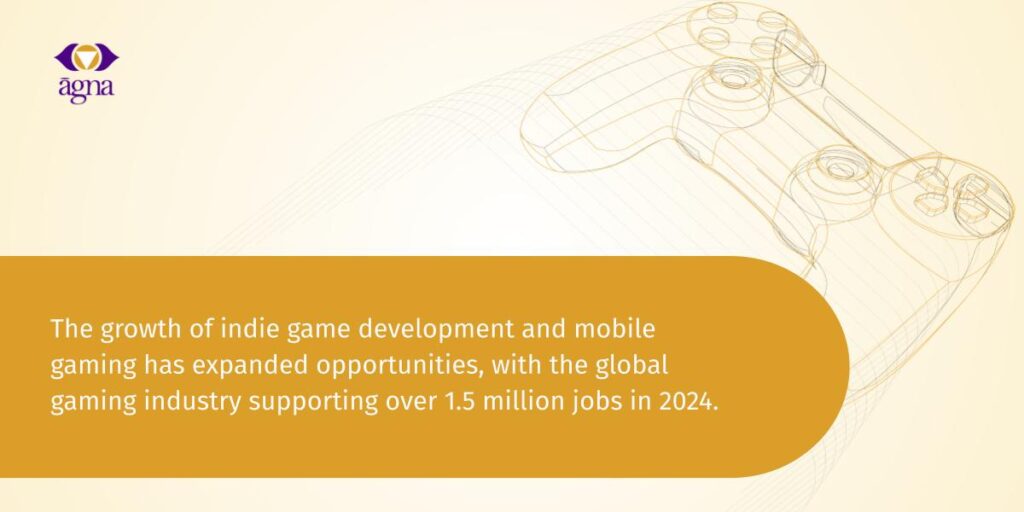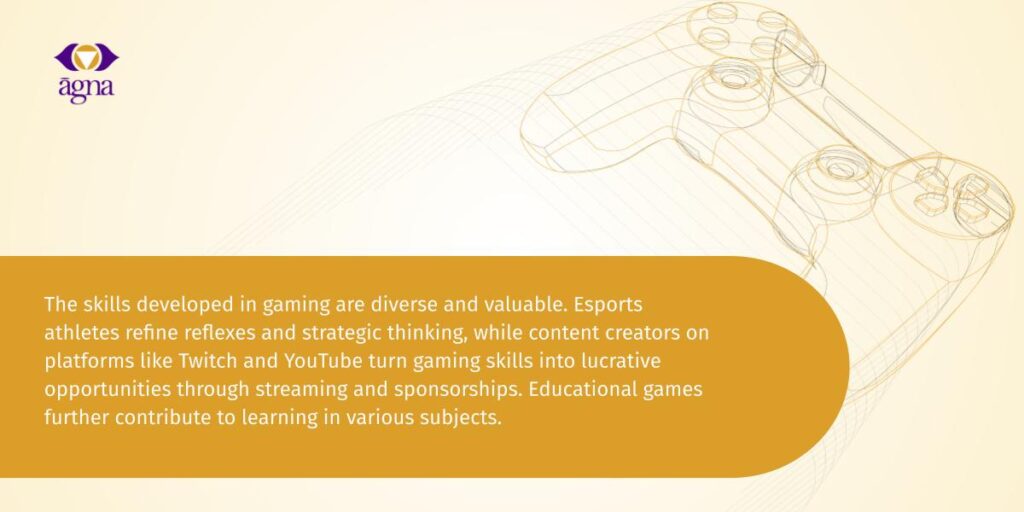Dear Reader,
Gaming levels up! Are you playing?
In 2024, the gaming industry is experiencing significant growth, driven by innovations across various segments. Q1 2024 saw investments of US$2.4 bn in the broader gaming industry, highlighting the growing interest and financial support for both traditional and emerging gaming ventures, encompassing mobile, console, and PC games and associated technology infrastructure.
Museletter Highlights:
- Agna Insights
Explore the gaming realm and the trends shaping the industry’s future - Agna Perspectives
Interesting and insightful reads we published over the last month - On the ‘Front’ier Tech
Latest updates from the Frontier Tech Ecosystem - Agna Recommends
Team Agna’s curated recommendations for you
The growing integration of emerging technologies such as AI, VR, and blockchain is a key driver of this investment boom. These technologies are enhancing gaming experiences and expanding the industry’s horizons, making gaming more immersive and interactive. Casual and mobile games continue to dominate, with their simple mechanics and widespread appeal, capturing a significant market share.
Furthermore, the development of live-service and premium game strategies, alongside the rise of social gaming on mobile platforms, has fostered vibrant gaming communities and increased player engagement. The educational value of games is increasingly recognised, with many parents acknowledging their potential to enhance learning and skill development.
Key trends for 2024 include the expansion of social interaction within games, the continued popularity of casual and educational games, and the integration of sophisticated economic models and governance structures in gaming ecosystems. These trends are shaping a dynamic and rapidly evolving market, attracting both gamers and investors worldwide.
Continue reading to dive deeper into the realm of gaming and explore the innovations and trends shaping the industry’s future!
Agna Insights
Gaming has transformed from a niche hobby, dismissed as an unnecessary distraction, into a global phenomenon. It has become a money-spinner, a cognitive enhancer, and a tribe builder, influencing various aspects of culture, technology, and the economy. Gaming has a symbiotic relationship, both drawing from and influencing these realms, creating a fluid bridge between the real and virtual worlds. Initially centered around simple arcade games and home consoles, the industry has evolved to encompass open-world multi-platform straddling across PC, mobile, consoles, and now devices that offer immersive experiences through extended reality (XR) capabilities. The significance of gaming lies not only in entertainment but also in its ability to foster social connections, drive technological innovation, and create lucrative investment opportunities. According to leading gaming data platform Newzoo’s May 2024 report, the global gaming market is projected to reach US$218.7 bn this year, up from US$211.2 bn in 2023, driven by a 10% revenue growth in the US and 222 mergers and acquisitions.
Evolution of Gaming
In the early 1970s, arcade classics like “Pong” and “Space Invaders” captivated players and soon transitioned to home consoles in the 1980s with systems like the Atari 2600 and NES. By 1983, the gaming industry generated US$3.2 bn annually.
Traditional games like Monopoly, Scrabble, Poker, and Bridge also provided family entertainment and have now found new life in digital versions, allowing global play on mobile devices.
The 1990s saw the rise of PC gaming with titles like “Doom” and “Warcraft,” introducing online multiplayer experiences followed by the late 2000s that brought the mobile gaming revolution with hits like “Angry Birds” and “Candy Crush Saga.” Currently, mobile gaming contributes around 51 percent of the total global video game revenue.
Today, VR and AR are creating immersive experiences, and AI is enhancing game design and player interaction. Leading companies like Meta, Sony, and Microsoft are advancing VR technology, with the VR gaming market expected to reach US$45 bn by 2027.
From arcade games to VR and AI innovations, the gaming industry continues to evolve, promising even more thrilling adventures and immersive experiences.
Importance of Gaming
Gaming goes beyond entertainment; it significantly enhances cognitive functions like problem-solving, spatial awareness, and strategic thinking. This is evident in studies showing improved visuospatial skills among regular gamers compared to non-gamers.
Moreover, gaming fosters global collaboration and communication through online multiplayer experiences. Games like “Fortnite” and “Among Us” create communities that transcend geographical boundaries, with “Fortnite” boasting over 400 million registered players as of 2024.

Gaming has also created real-world opportunities. For instance, Gran Turismo’s realistic driving simulation led to the GT Academy by Nissan, which identified talented sim racers for real-life professional racing careers.
The cultural influence of games is profound, seen in successful adaptations like HBO’s “The Last of Us” and Netflix’s “The Witcher,” drawing millions of viewers and highlighting the enduring appeal of game-based narratives.
Looking ahead, gaming’s impact will continue to evolve, driving advancements in technology, education, and cultural representation, shaping the future of entertainment and skill development.
The Future of Gaming: Investment Opportunities
Current Innovations in Game Development and Publishing
The gaming industry continues to innovate with advancements in graphics, AI, and cross-platform play. Subscription services like Xbox Game Pass and PlayStation Now offer gamers access to vast libraries of games for a monthly fee, changing the way games are consumed. As of the latest data, Xbox Live has around 100 million subscribers, more than doubling from 39 million in 2016, while PlayStation Plus has 47.3 million subscribers.
Emerging wave of gaming innovations
AI is revolutionising game development by improving graphics, character behaviours, and environmental interactions, making high-quality game production faster and cheaper.
Mobile devices can’t keep up with the processing demands of high-end games, but cloud gaming offloads this to remote servers, providing a high-quality experience without expensive hardware.
AR and VR are transforming gaming and enterprise applications with immersive experiences, thanks to innovations in lighter, more comfortable headsets and sophisticated software.
Blockchain ensures secure digital identities, enables asset transfer across games, and supports fundraising and monetisation through tokenisation and in-game economies, fostering a more interconnected gaming ecosystem. These innovations are creating new opportunities for avid gamers to potentially pursue gaming as a career.
Categories and Rationale for Investment
Investment Appeal:
Games and studios, especially those that are hyper-specialised and localised, remain attractive. Independent game studios raised over US$1.6 bn in 2022.
Growth Potential:
Blockchain and cloud technologies offer significant opportunities for innovation and scaling. The blockchain gaming market is projected to grow from US$1.39 bn in 2022 to US$7 bn by 2025.
Market Demand:
Investment in mixed reality hardware and handheld gaming devices is growing. AR/VR hardware sales are expected to reach US$25.6 bn by 2026.
Furthermore, there are two more developments anticipated to propel the gaming industry to new heights:
- “Empowering hyperspecialisation” in gaming means individuals or teams become experts in a specific aspect of game development, like designing first-person shooter (FPS) games. This expertise comes from years of experience and understanding of the genre, its mechanics, and player appeal. Small, specialised teams have increased market share by 25%, as per a 2023 Newzoo report, leveraging AI-driven tools and robust platforms for efficient innovation.
- Mobile gaming is set to revolutionise the industry, driven by adoption in emerging markets. The global mobile gaming market size surpassed US$184.4 bn in 2022 and is projected to reach around US$775.69 bn by 2032, expanding at a notable CAGR of 15.5% from 2023 to 2032.
Gamification and Socioeconomic Impact
Gamification has revolutionised education and training, enhancing engagement and learning outcomes. It is pervasive, with companies integrating game-like elements into platforms to enhance engagement. Aligning gamified activities with long-term goals can help avoid short-sighted pursuits and foster resilience. For example, Duolingo, a language learning app, boasts over 600 million registered users in 2024.
Choosing games that benefit all participants promotes community and collaboration while valuing intangible rewards like personal growth and relationships, offering deeper fulfillment.
Gamification leverages innate human behaviors like achievement, competition, and social interaction to deepen engagement with content. It offers immediate feedback crucial for learning and uses rewards to reinforce positive behaviors, fostering continued engagement.
The gaming market in India went from US$0.8 bn in 2019 to US$2.6 bn in 2022. Moreover, it is projected to reach US$8.6 bn by 2027.
Gamification has the potential to revolutionise education, training, and daily tasks by leveraging human behaviors, making learning more engaging and effective.

Regional Analysis
The global gaming industry is experiencing a significant transformation driven by demographic shifts, technological advancements, and evolving consumer preferences. The industry can be analysed through three primary lenses: 1. consumer/end-user markets, 2. game development hubs, and 3. capital investment regions. Here is a detailed regional analysis highlighting the key aspects of each region, supported by relevant data.
Consumer/End User Geos (Market)
India’s gaming market is set to reach US$2.8 bn this year, up from US$1.2 bn in 2020.
Brazil’s gaming market is projected to grow to US$2.3 bn this year.
Southeast Asia’s mobile gaming market was worth US$5 bn in 2022 and is expected to reach US$8.4 bn in 2024, growing at a CAGR of 17%.
Casual games dominate due to accessibility, but interest in immersive experiences like MMORPGs is growing.
With 568 million gamers and over 9.5 billion gaming app downloads in 2023, India stands as the world’s largest gaming market.
Latin America embraces e-sports, with the region’s e-sports market expected to hit US$46 mn by the end of 2024.
Southeast Asia’s high smartphone adoption rate (80%) fuels its mobile gaming dominance.
Game Development Geos (Game Creators)
United States: US$90 bn gaming industry, leading in AAA and indie game development.
Southeast Asia (Vietnam, Malaysia): Growing hotspots with Vietnam’s gaming industry expected to double in 2024.
Singapore and Taiwan: Combined gaming market value exceeding US$2 bn, known for advanced tech ecosystems.
China: US$41 bn gaming market, steady growth expected in mobile and online sectors.
Capital Geos (Investors)
North America:
Silicon Valley and tech hubs investing heavily in gaming start-ups, with investments reaching US$2.1 bn in 2023. Focus on AR/VR, cloud gaming, and AI-driven experiences.
Europe:
Supporting innovative gaming tech and e-sports, with the gaming market valued at US$34 bn in 2023.
Middle East:
UAE and Saudi Arabia investing significantly in gaming and e-sports for economic diversification. Middle East Gaming Market estimated at US$ 6.34 bn in 2024, expected to reach US$10.69 bn by 2029 at a CAGR of 11.02%.
Key Players in Distribution:
The gaming industry has major publishers such as Blizzard Entertainment, Electronic Arts (EA), and Ubisoft. Blizzard, with a revenue of US$8.09 bn in 2022, continues to captivate audiences with titles like World of Warcraft and Overwatch. EA, generating US$7.4 bin in FY23, dominates the sports gaming sector with its FIFA and Madden NFL series, while in the same year, Ubisoft, earning US$4.3 bn, excels with its Assassin’s Creed and Far Cry franchises. Pop culture influence is significant, with game adaptations like “The Witcher” on Netflix and movies such as “Sonic the Hedgehog” enhancing the industry’s reach and engagement.
Indie developers are also making a substantial impact, with platforms like Steam and the Epic Games Store enabling the success of titles like Hades and Among Us. Traditional card and board games, including Magic: The Gathering, and Catan, continue to thrive, aided by digital adaptations that broaden their appeal.
Responsible Gaming:
Western countries, such as the US, UK, and Australia, are advancing responsible gaming through strict regulations, including the ESRB and PEGI rating systems, and policies limiting loot boxes and microtransactions. Meanwhile, East-West convergence efforts promote best practices like AI-driven age verification and screen time management, contributing to the growth of gaming hubs in the US, Canada, China, South Korea, and the UAE.
Conclusion:
Gaming’s evolution from simple arcade machines to a multi-billion-dollar global industry underscores its profound impact on technology, culture, and the economy. With innovations in VR, AR, AI, and the growing importance of mobile and casual gaming, the industry continues to expand its reach and influence. The diverse opportunities for investment, from esports to blockchain-based games and its associated technology infrastructure, highlight gaming’s potential as a lucrative and dynamic sector. As the gaming market integrates advanced technologies and adapts to new trends, its ability to foster social connections, enhance cognitive skills, and drive economic growth remains unparalleled. Looking ahead, the gaming industry’s resilience and innovation promise to keep it at the forefront of entertainment and technological advancement, shaping the future of digital interaction and global connectivity.
Agna Perspective
1. Start-up starter to UAE: The UAE’s Digital Economy Strategy aims to double the digital economy’s GDP contribution, but rising cybersecurity threats demand robust solutions, presenting significant market opportunities and challenges. Startups offering cost-effective cybersecurity solutions can thrive in this growing and supportive environment. Read here
2. Let’s calm the cyber storms: The UAE’s digital economy growth presents cybersecurity challenges and market opportunities, driving demand for dynamic solutions. Startups can thrive in a supportive environment with public-private partnerships, offering economical yet robust cybersecurity solutions amid rising cyber threats. Read here
3. AI pushing the boundaries: AI is revolutionising gaming by creating lifelike NPCs, endless exploration, and personalised experiences, enhancing immersion and engagement. These advancements promise faster, cost-effective game development, boosting the gaming industry’s growth. Read here
4. Family offices choosing emerging managers: Family offices, long associated with conservative investments and a primary focus on wealth preservation, are increasingly venturing into the exciting but high-risk world of venture capital. Their goal? To achieve outsized returns and diversify their portfolios in today’s dynamic market. In this pursuit, they are also exploring new avenues to collaborate with emerging fund managers, that can potentially give them an edge among their contemporaries. Read here
On the ‘Front’ier Tech:
- Starship by SpaceX: SpaceX achieved remarkable milestones with the fourth test flight of Starship, the most powerful rocket ever built. Launched from Boca Chica, Texas, the uncrewed mission successfully demonstrated key objectives, including reusability and controlled reentry. Notably, the Super Heavy booster executed a soft splashdown for the first time, while the Starship capsule completed orbital insertion and a controlled reentry, showcasing its robust heat shield. Read here
- India’s Gaming Potential: India’s Prime Minister Narendra Modi has pledged to elevate the country’s gaming industry to global prominence, emphasising its immense potential and commitment to supporting Indian gamers and developers. With the Indian gaming industry generating US$3.1 bn in FY23 and over 500 million players nationwide, the sector is poised for significant growth. Read here
Agna Recommends:
- 1. Thinking in Bets– in this book, Annie Duke explores decision-making through the lens of poker, emphasising the importance of evaluating choices based on probabilities rather than outcomes. Duke argues that adopting a probabilistic mindset helps mitigate cognitive biases and improve judgment in uncertain situations.
2. Acquired Podcast– This podcast delves into the world of mergers, acquisitions, and entrepreneurship, featuring discussions with industry leaders, experts, and founders sharing insights, strategies, and experiences in the business landscape.
Questions? Feedback? Different perspective?
We invite you to engage with us and collaborate.
Warm Regards,
Team Agna
Click below to join our mailing list for The Agna Museletter.
